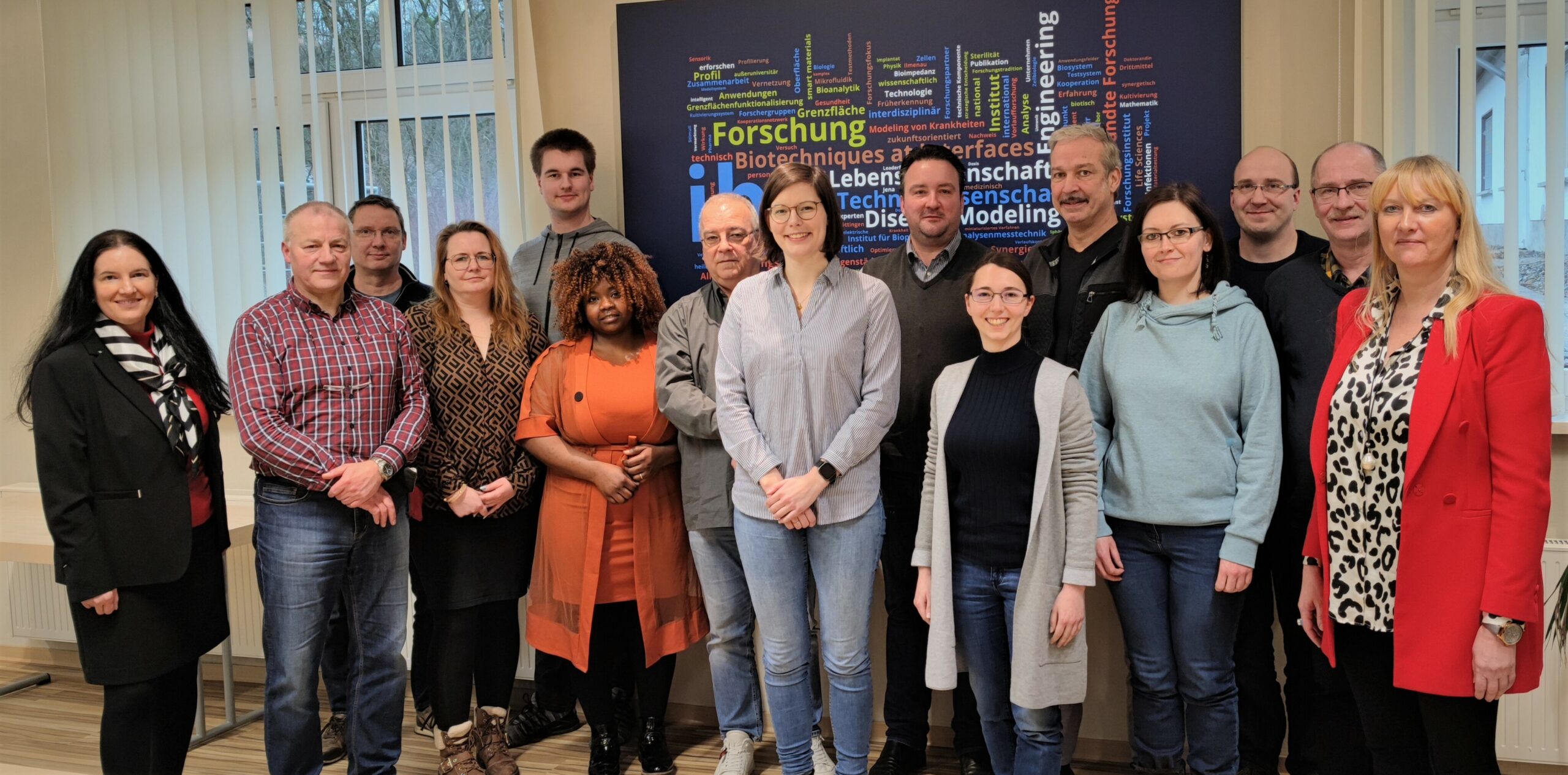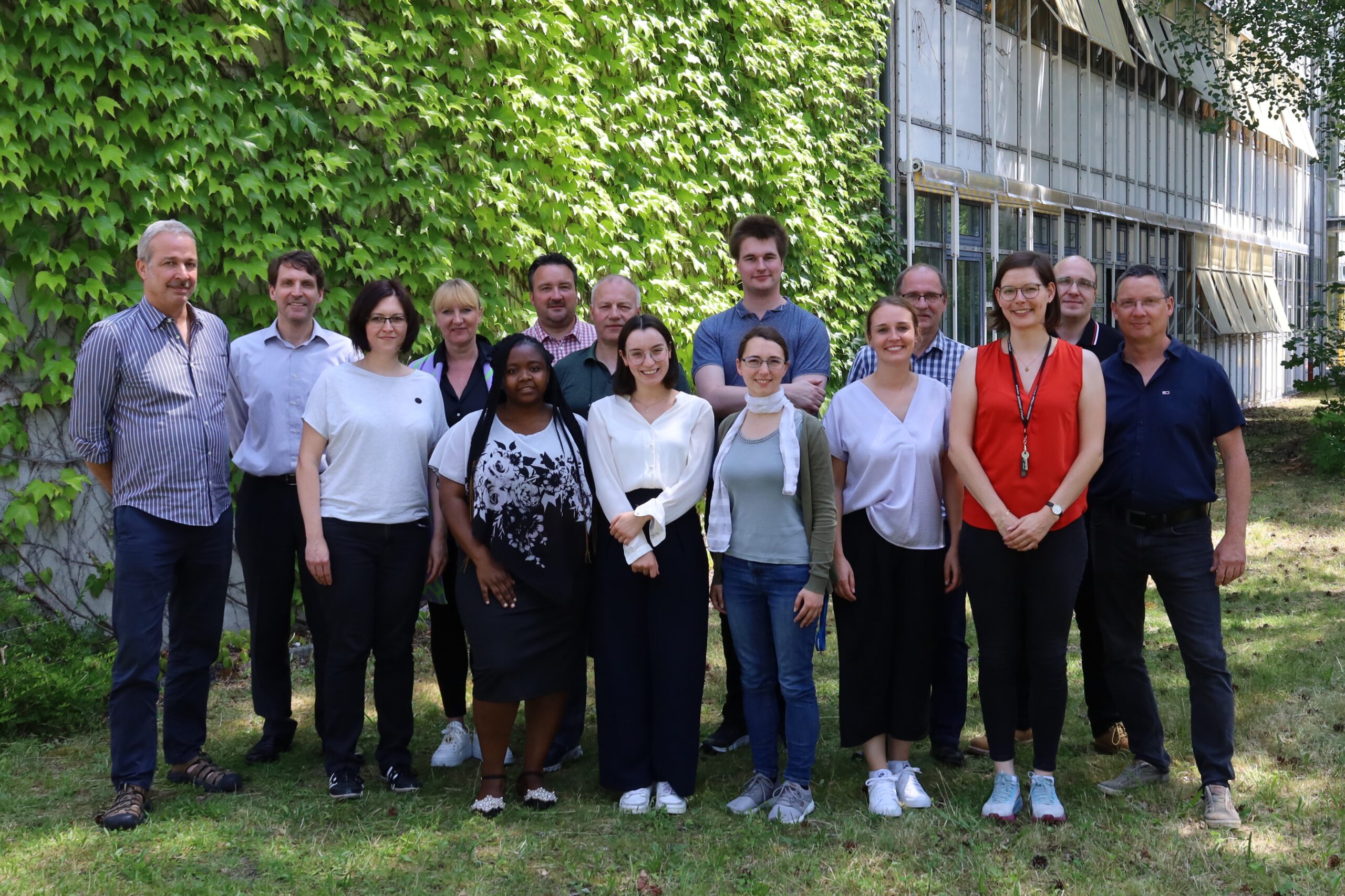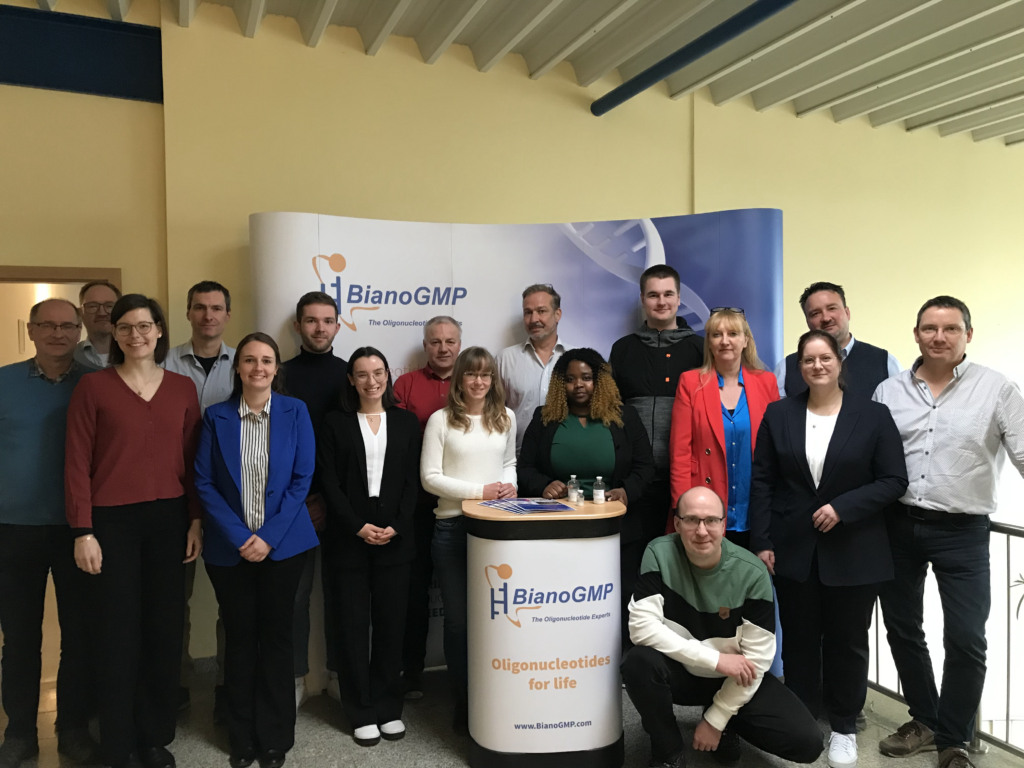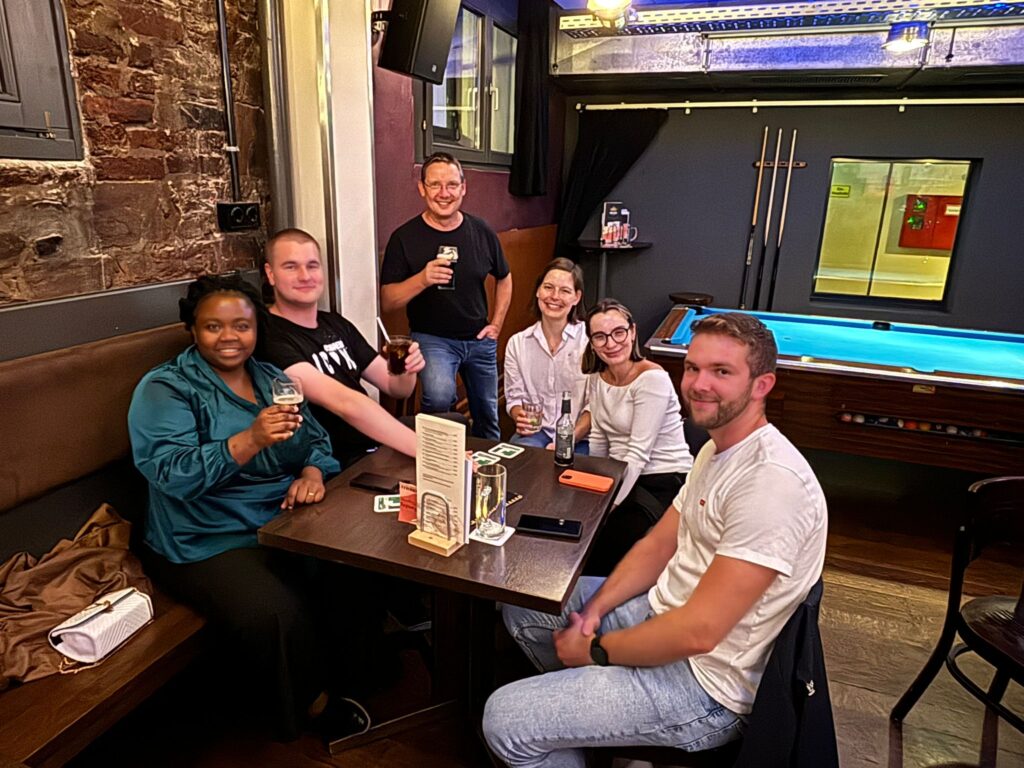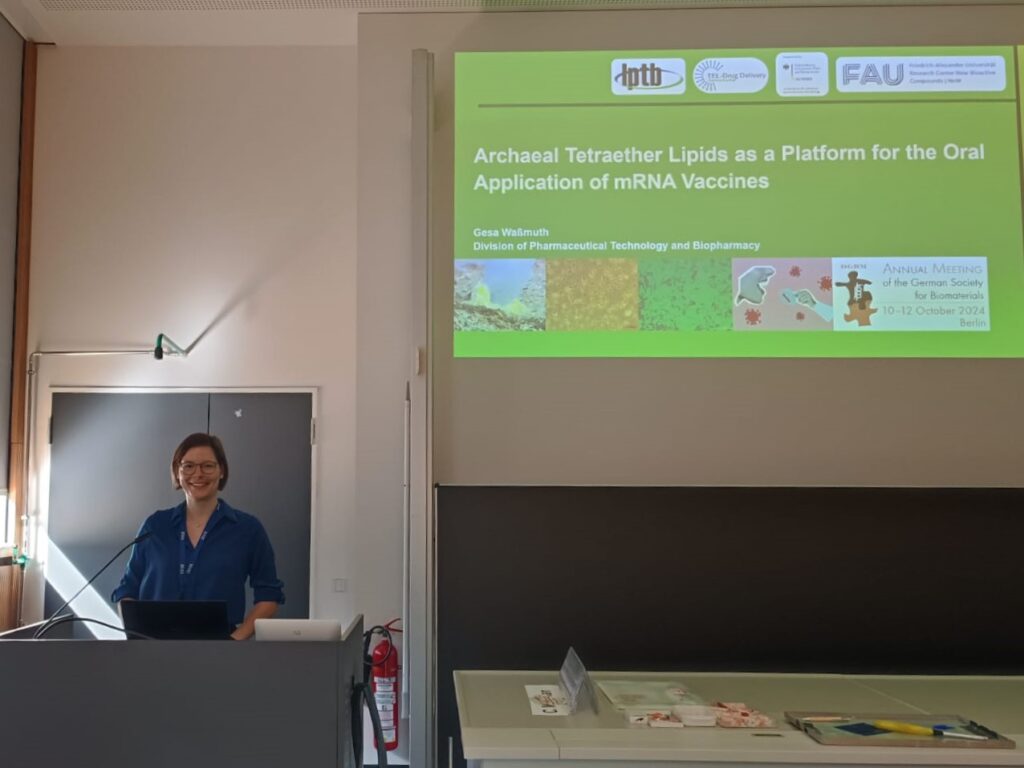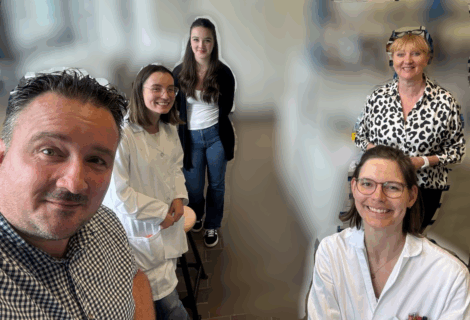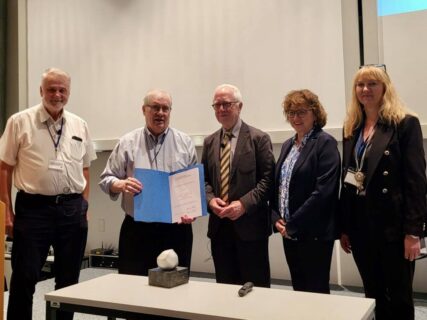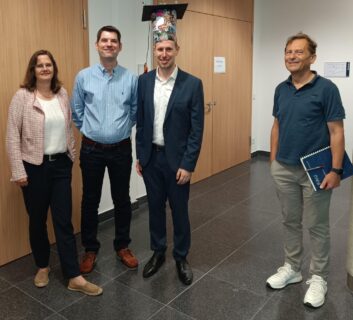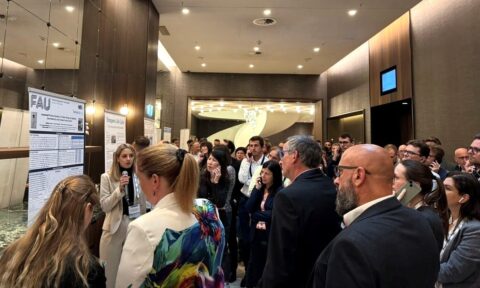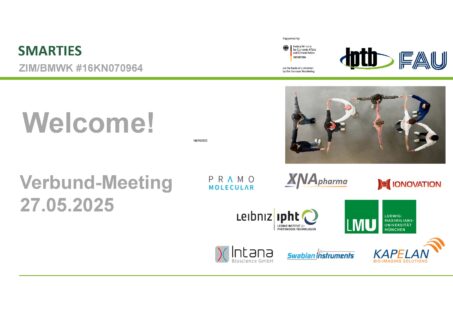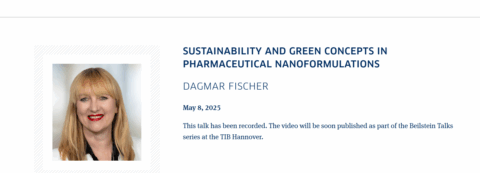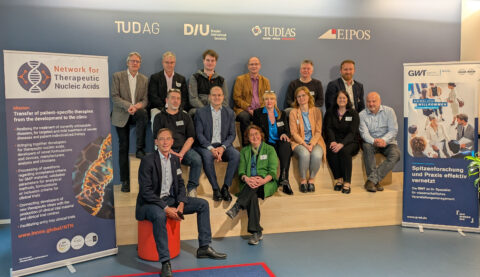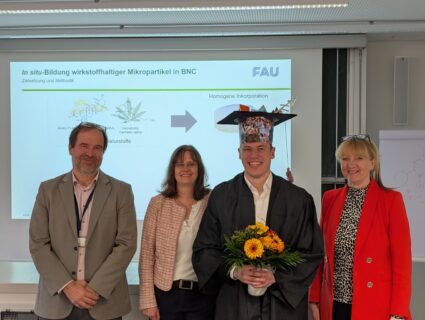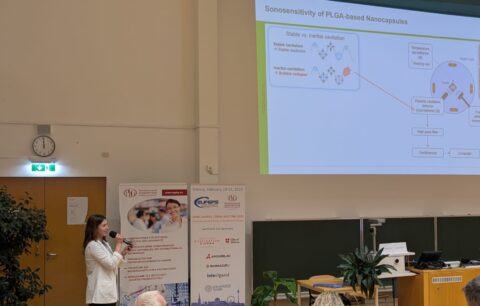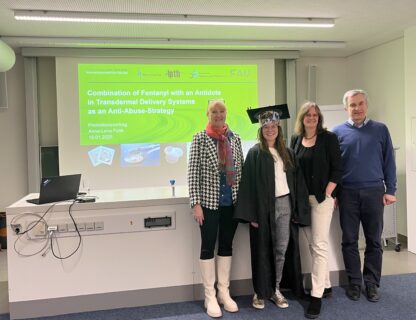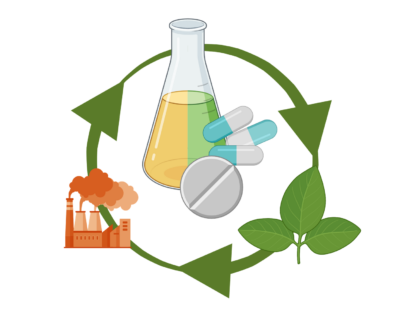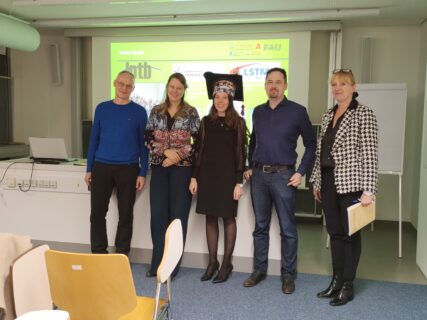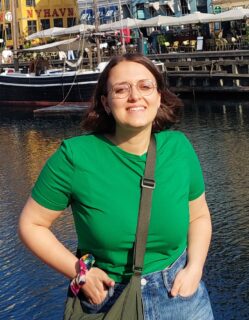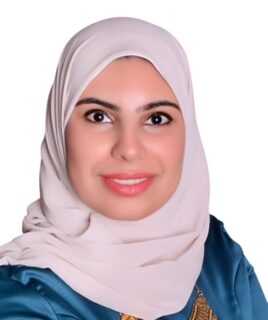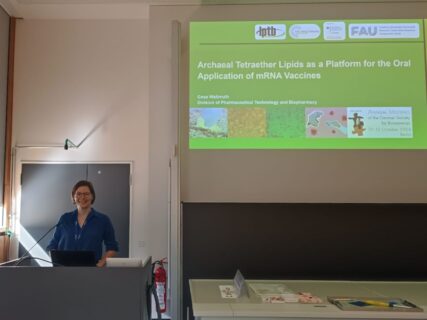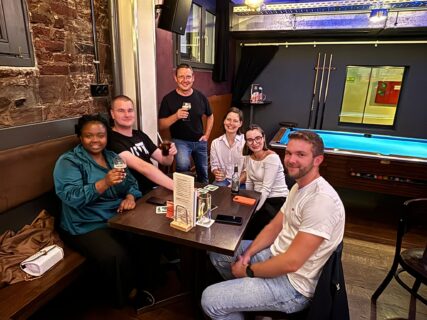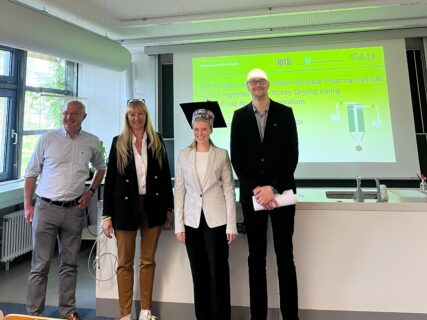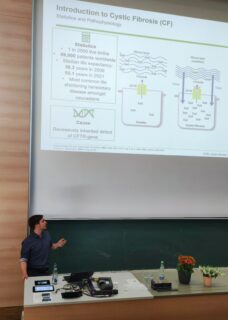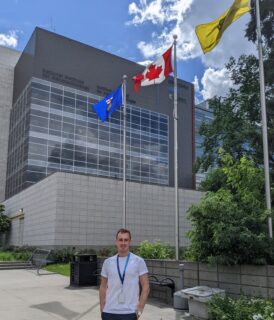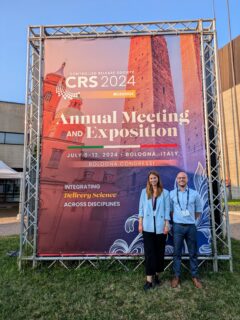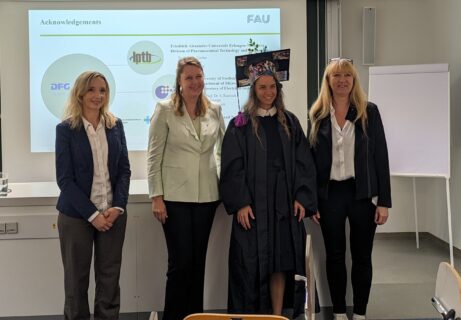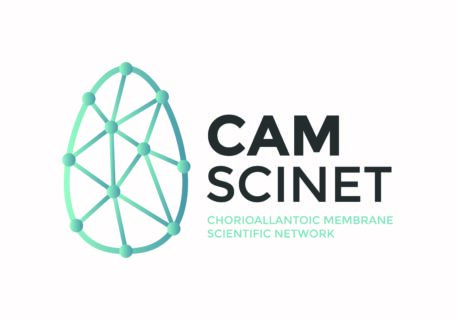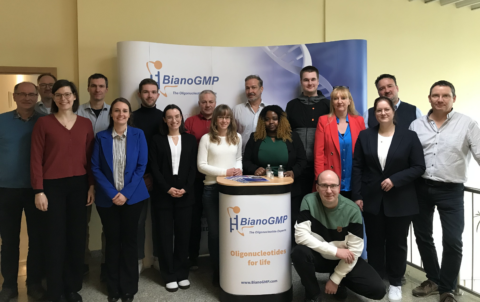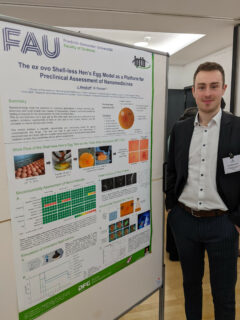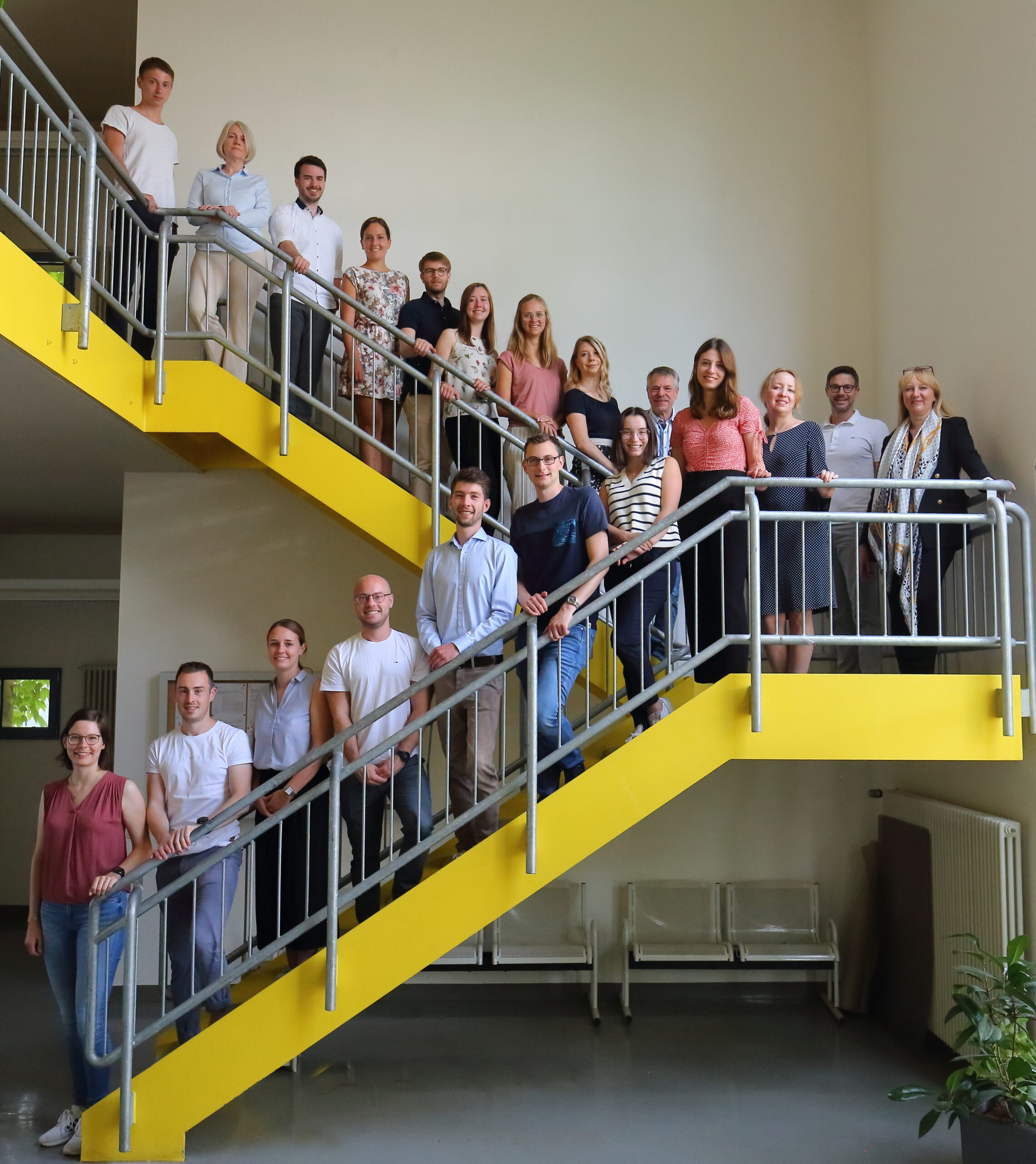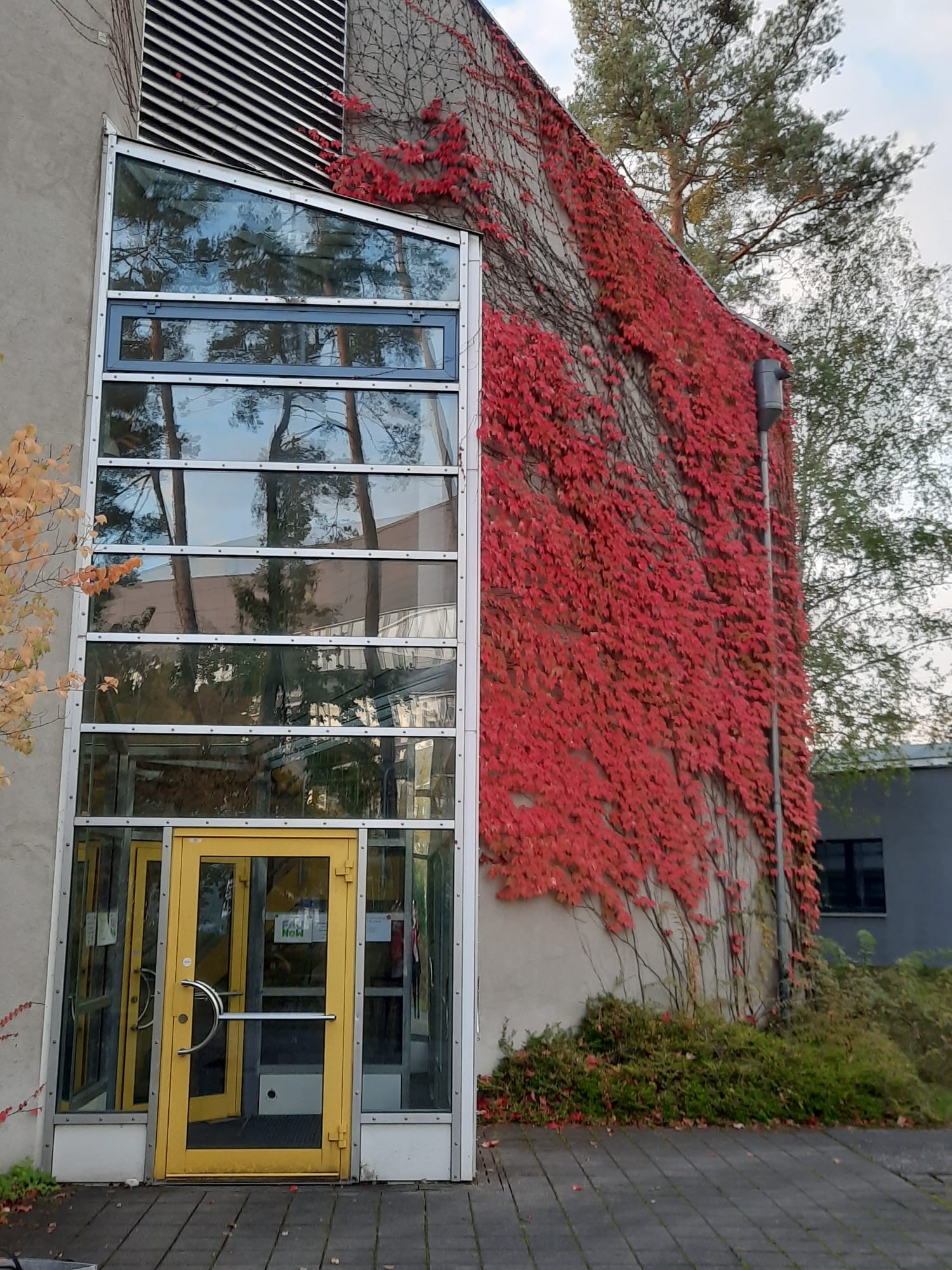Index
TEL-Drug Delivery Project
Im vorliegenden Projekt soll ein Transportsystem für die orale Applikation von mRNA-Impfstoffen entwickelt werden, welches den sicheren, stabilen und effizienten Transfer von mRNA in den Darm durch Verwendung säurestabiler Speziallipide gewährleistet.
Vorteilhaft sind (1) die patientenfreundliche Applikationsform, (2) die potentiell bessere Bioverteilung und höhere Stabilität der mRNA Wirkstoffe und (3) ein einfacher und nachhaltiger Herstellungsprozess. Damit sollen mRNA-Impfungen einfach, kosteneffizient und ohne großen logistischen Aufwand, z.B. auch in Entwicklungsländern möglich werden.
Gefördert durch das Bundesministerium für Wirtschaft und Klimaschutz, Fördernummer 16LP403003
Aktuelles 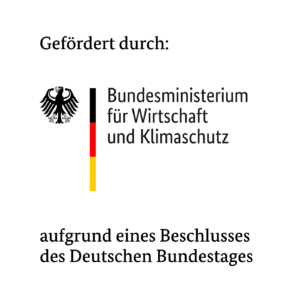
Verbundpartner
BianoScience: https://bianoscience.com/
Projektleiter und Koordinator: Dr. T. Pöhlmann
ifb (Insitut für Bioanalytik, Umweltoxikologie und Biotechnologie): https://ifbhalle.de
Projektleiter: Dipl.-Ing. O. Scheufler 
Ionovation: https://www.ionovation.com
Projektleiter: Dr. K. Gall
iba (Institut für Bioprozess- und Analysenmesstechnik): https://www.iba-heiligenstadt.de/
Projektleiter: Prof. Dr. K. Liefeith
Gruppenfoto der Beteiligten am TEL-Drug Delivery Projekt
Pressemeldungen:
https://www.986charivari.de/funkhaus-nachrichten/2899-fau-forscht-an-schluckimpfung-gegen-corona
https://www.fau.de/2023/02/news/wissenschaft/schluckimpfung-aus-vulkanregionen/
2. Verbundmeeting TEL-Drug Delivery in Erlangen am 20.06.2023
Die FAU heißt am 20.06.2023 die Projektteilnehmer von TEL-Drug Delivery zum Austausch aktueller Daten am Lehrstuhl für Pharmazeutische Technologie und Biopharmazie herzlich willkommen!
TEL-Drug Delivery – Subteam Meeting am 08.12.2023 in Gera
Dieses Mal trafen wir uns bei BianoGMP, um über die ersten vielversprechenden Transfektionsergebnisse von mit mRNA beladenen Archaeosomen zu diskutieren. Schritt für Schritt kommen wir mit der oralen mRNA-Verabreichung voran und haben unseren ersten Meilenstein des Projektes erreicht. Vielen Dank an das gesamte TEL-Drug Delivery Team!
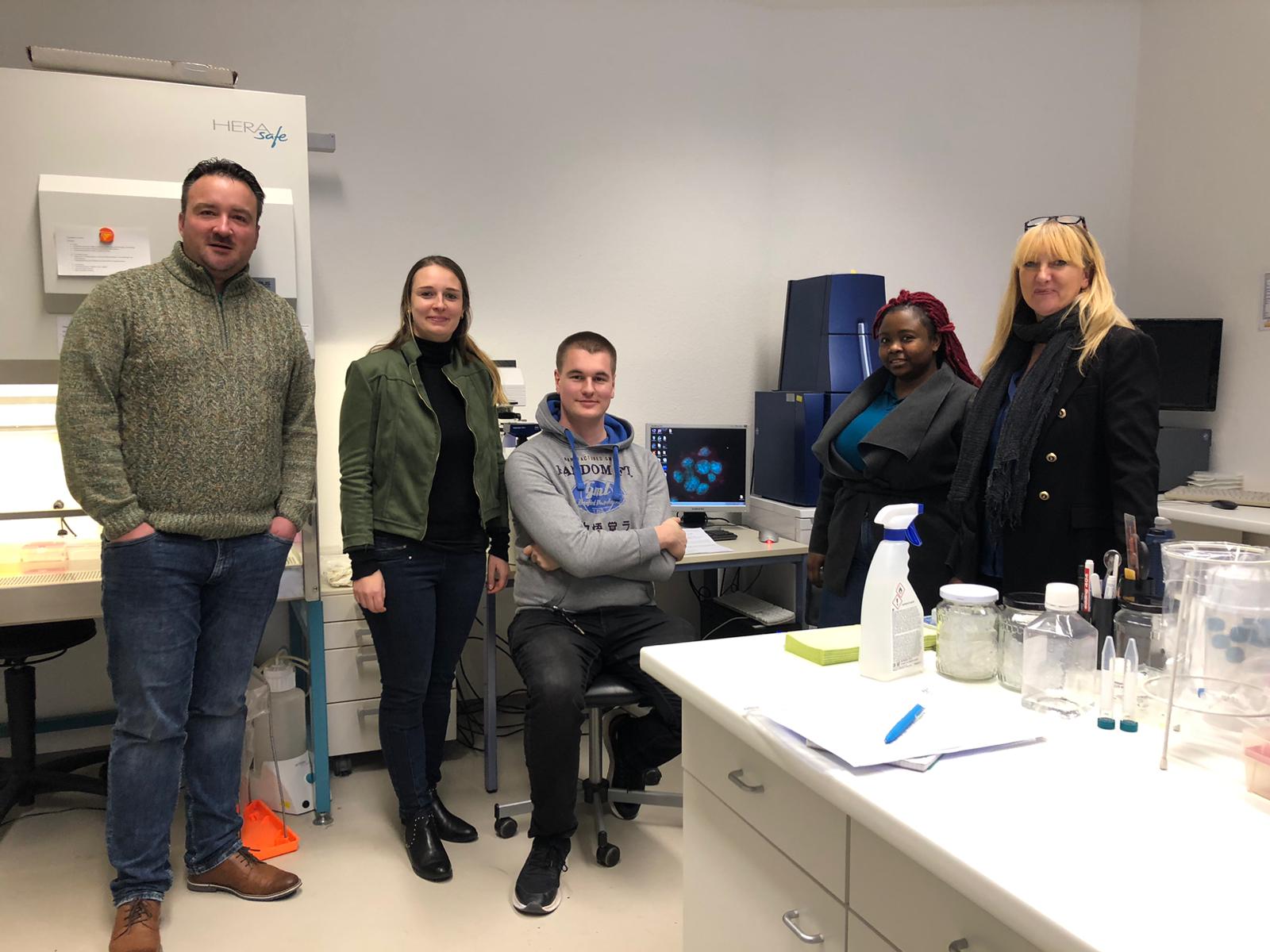
3. Strategic Meeting TEL-Drug Delivery: First Milestone reached!
Thank you very much BianoGMP for hosting us in Gera at 5 April 2024 to discuss the latest data. Our first milestone was sucessfully reached and we are looking forward to our next collaborations.
Foto: Privat
4. Strategic Meeting TEL-Drug Delivery in Osnabrück
Thank you very much Ionovation for hosting us in Osnabrück at 16.-17.9.2024 to discuss the latest data, file the papers and create new ideas!
Foto: privat
TEL-Drug Delivery at the Annual Meeting of the DGBM
Gesa Waßmuth presented her latest research in the TEL-Drug Delivey Project with the title “Archaeal Tetraether Lipids as a Platform for the Oral Application of mRNA Vaccines” at the Annual Meeting of the German Society for Biomaterials, from 10-12 October in Berlin.
Foto: Privat
Dr. Mona Mahmoud joint the TEL-Drug Delivery project! – November 2024
We are happy to announce that Dr. Mona Mahmoud joint today the TEL-Drug Delivery project and supports the project team with her biological and drug delivery expertise.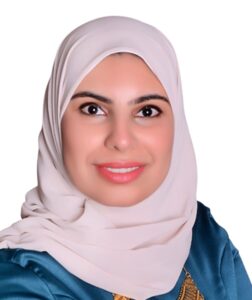
We wish you a good and sucessfull start!
Foto: Privat
Outreach
Gihan Fathy Mahmoud
Innovative vectors for non-viral gene therapy using detergent dialysis technique
Marius Bauer
Aufklärung von Struktur-Aktivitäts -Beziehungen nichtionischer hydrophiler und kationischer Polymere für den medizinischen Einsatz
Matthias Zink
Entwicklung innovativer nicht-viraler Vektoren zur Gentherapie
Stefan Grund
Polymere als Wirkstoffträger für Oligonukleotide: Toxikologische Untersuchung von Polymeren sowie physikochemische Charakterisierung von Polyplexen und Untersuchung der Transfektionseffizienz
Astrid Müller
Entwicklung von Arzneistoffträgersystemen auf der Basis von bakterieller Nanocellulose
Sebastian Moritz
Bakterielle Nanocellulose als Arzneistoffträgersystem für wirkstoffhaltige Wundauflagen
Florian Schlenk
Toxikologische Charakterisierung von Nanomaterialien für die diagnostische Bildgebung in der Medizin
Rima Jaber
Optimization of Processes for Biodegradable Polymers Manufacturing and Formulation
Yvette Pötzinger
Bakterielle Nanocellulose als Drug Delivery-System für Nukleinsäuren
Habibollah Arefian
Gesundheitsökonomische Evaluation von Krankenhausinfektionen
(unter Zusammenarbeit mit Prof. Hartmann des Universitätsklinikums Jena)
Sven Kattner
Entwicklung von PLGA-Nanopartikeln als Drug Delivery System für lipophile Wirkstoffe, die in die Arachidonsäurekaskade eingreifen
Paul Warncke
Entwicklung präklinischer Testmodelle an Hühnereiern in der Arzneimittelentwicklung
Yaser Alkhatib
Bacterial Nanocellulose as Drug Delivery System for Lipophilic Drugs
Felix Schmidt
Nanoemulsionsbasierte Trägersysteme aus natürlichen Bestandteilen zur dermalen Anwendung
Niels Dusek
Modifizierte Polysaccharide als Vektoren für den Transport von Nukleinsäuren
Tim Wenzel
Innovative Technologien in der Gefriertrocknung und ihr Einfluss auf Prozessentwicklung, Trocknungsverhalten und Produktqualität: Eine Fallstudie zu kontrollierter Eisnukleation und neuen Packmitteln
Julia Ernst
Ex vivo-Untersuchung des therapeutischen Potentials von Nanopartikel-basierten inhalativen Antibiotika-Formulierungen zur Behandlung von Biofilm-assoziierten Infektionen bei Cystischer Fibrose
Bastian Hearing
Tangential flow absorption model (TFAM) – Development of an absorptive dissolution model for formulation screening of poorly water-soluble drugs
Martin Rabel
Biologische Elimination komplexer diagnostischer Nanopartikel
Berit KARL
Bakterielle Nanocellulose als Trägermaterial zur Modulation von Entzündungen
Pia Haulitschek, Geb. Hiltl
Formulation and Characterization of Sonosensitiv Organic Nanoparticles
Darius Gawlik
Molekulare epidemiologische Multiparameteranalyse zur Aufklärung der Populationsstruktur von Staphylococcus aureus
Viktoria Demina
Evaluierung von proteinbasierten Nanopartikeln als Drug Delivery System
Lisa Müller-Bötticher
Entwicklung von Nanopartikeln zur Inhalation bei Cystischer Fibrose-assoziierten pulmonalen Infektionen
Felix Prihoda
Aggregation und Inaktivierung von Enzymen während der Trocknung und Partikelbildung von levitierten Mikrotröpfchen
Sven Grune
Verwendung von alternativen Lösungsmitteln zur Verkapselung von lipophilen Naturstoffen in polyesterbasierte Nanopartikel
Franz Hack
Guanidinhaltige Nanopartikel als nicht-virale Vektoren für den Transport von Nukleinsäuren
Nils Dusek
Modifizierte Polysaccharide als Vektoren für den Transport von Nukleinsäuren
Lennart Pusch
Preparation und Characterization of Poly lactic-co-glycolic acid Nanoparticles for Ex-vivo Immunomodulation
(in Zusammenarbeit mit Prof. Dr. Holger Hackstein, Tranfusionsmedizin, UKE)
Ula Savsek
Formulation and Characterization of Polymer nanoparticles for Ultrasound-induced Drug Release
Carolina Corell
Formulation of poorly water-soluble pharmaceutical active ingredients by spray drying using three-fluid nozzle atomization
Nadja Kohler
Austausch von Rohstoffen der lipophilen Phase und des Emulgators in halbfesten Zubereitungen zur topischen Anwendung
Anna-Lena Funk
Combination of Fentanyl with an Antidote in Transdermal Delivery Systems as an Anti-Abuse-Strategy
Tom Bellmann
Entwicklung von Strategien für die Kurz- und Langzeitfreisetzung von Wirkstoffen aus bakterieller Nanocellulose für topische Anwendungen
Baudiß, Kristin (Diplom)
Granulierung von Vitaminen: Schmelzextrusion
(in Zusammenarbeit mit Merck Selbstmedikation GmbH, Darmstadt)
Bergner, Simone (Diplom)
Synthese und biologische Wertbestimmung Polyethylenglykol-gekoppelter alkalischer Phosphatase
(in Zusammenarbeit mit Prof. Dr. Götz Nowak, AG “Pharmakologische Hämostaseologie”, Universitätsklinikum Jena)
Sorge, Marien (Diplom)
Optimierung eines Granulationsprozesses im Hinblick auf die Verbesserung der Tablettierbarkeit
(in Zusammenarbeit mit Schering GmbH und Co. Produktions KG, Weimar)
Lautenschläger, Christian (Diplom)
Zyto- und hämatotoxikologische Untersuchungen von Polyethylenglykol als Grundlage für die Entwicklung neuer Stealth®-Polymere
Ni, Zhixu (Bachelor)
Investigation of Freeze Dried Bacterial Nanocellulose as Drug Delivery – System for the Model Protein Albumin
(in Zusammenarbeit mit der Wuhan University, Wuhan, China)
Steinbauer, Beate (Diplom)
Bestimmung der sichtbaren Rückstandskonzentrationen verschiedener pharmazeutischer Stoffe auf Oberflächen mittels Spiking-Studien
(in Zusammenarbeit mit der Dr. Wilmar Schwabe GmbH & Co. KG, Karlsruhe )
Zink, Matthias (Diplom)
Bakterielle Nanocellulose als neues Drug-Delivery-System: Untersuchungen zum Trocknungsverfahren
Stampniok, Marlies (Diplom)
Strukturaktivitätsbeziehungen von Dextranen als nichtvirale Vektoren in der Gentherapie
Schröder, Susann (Master)
Bio- und Hämokompatibilitätsuntersuchungen von Poly(2-methyl-2-oxazolin)en als Stealth®-Polymere
(in Zusammenarbeit mit der Ernst-Abbe-Fachhochschule Jena)
Lehsing, Sven (Diplom)
Synthesis and in vitro evaluation of a novel inductor of B-cell apoptosis
(in Zusammenarbeit mit Prof. Jindrich Kopecek, University of Utah, Salt Lake City, USA)
Kugel, Tillmann (Bachelor)
Untersuchungen zum Adsorptions- und Desorptionsverhalten von bakterieller Nanoccellulose zur Verwendung als Wundauflage
(in Zusammenarbeit mit der Ernst-Abbe-Fachhochschule Jena)
Göbel, Anna (Diplom)
Isothiocyanats targeting cancer
(in Zusammenarbeit mit University of Otago, Dunedin, New Zealand)
Scholz, Patrik (Diplom)
Bakterielle Nanocellulose als Drug Delivery-System für die perorale Applikation
Neumann, Marie (Master)
Retardierung der Arzneistofffreisetzung aus bakterieller Nanocellulose als Trägersystem
(in Zusammenarbeit mit der Hochschule für Angewandte Wissenschaft, Köthen)
Brandenburger, Isabell (Diplom)
Umsetzung der Entwurfsvorlage für die Qualified Person´s Declaration zur GMP-Compliance von als Ausgangsmaterial eingesetzten Wirkstoffen und die Prüfung ihrer Lieferkette
(in Zusammenarbeit mit Novartis Pharma GmbH, Nürnberg)
Werner, Sebastian (Diplom)
Toxikologische Untersuchungen von ferromagnetischen Nanopartikeln mittels Alternativmethoden zum Tiermodell
Sonntag, Franka (Diplom)
Transportvalidierung von kühlpflichtigen Arzneimitteln am Universitätsklinikum Jena
(in Zusammenarbeit mit Prof. Dr. Hartmann, Apotheke des Klinikums Jena)
Rabel, Martin (Diplom)
Biologische Charakterisierung von Nanopartikeln aus bakterieller Nanocellulose
Springwald, Alexandra (Diplom)
Synthesis of peptidic inhibitors for a protease as a drug target against Chlamydia
(in Zusammenarbeit mit University of Otago, New Zealand)
Dusek, Niels (Diplom)
Übertragung eines Dragierprozesses vom klassischen Dragierkessel auf einen Trommelcoater
(in Zusammenarbeit mit der Bayer Weimar GmbH und Co. KG, Weimar)
Baldeweg, Florian (Diplom)
Entwicklung und Validierung von Methoden zur Bestimmung der Partikelgröße pharmazeutischer Ausgangsstoffe am Sympatec HELOS
(in Zusammenarbeit mit EXCELLA GmbH, Feucht)
Rahnfeld, Lisa (Diplom)
Bakterielle Nanocellulose als Trägermaterial in der Gentherapie
Fiedler, Franziska (Diplom)
Synthesis and characterization of a novel doxorubicin-based produg activated by a bioorthogonal reaction
(in Zusammenarbeit mit University of Otago, New Zealand)
Nguyen, Duc Son (Diplom)
Entwicklung und Implementierung eines Batch Record Review Prozesses für pharmazeutische Produkte aus Drittstaaten
(in Zusammenarbeit mit Novartis Pharma GmbH Nürnberg)
Arnold, Kathrin (Diplom)
Entwicklung von in-vitro Modellen der Lunge zur biopharmazeutischen Testung von Nanopartikeln
Lemser, Toni (Diplom)
Bewertung und Behebung der Hauptabweichungsereignisse aus Prozess- und Technologiegründen in einer pharmazeutischen Solidaproduktion
(in Zusammenarbeit mit der Bayer Weimar GmbH und Co. KG, Weimar)
Mohr, Charles Michael (Diplom)
Evaluation von modernen Surfactants und Curcumin-Nanokristallen zur dermalen Applikation
(in Zusammenarbeit mit Pharmazeutischer Technologie, Universität Marburg)
Hack, Franz Josef (Diplom)
Characterization of Polyplexes of Hydroxyethyl Starch – Polyethylenimine with Oligonucleotides
(in Zusammenarbeit mit der Texas Tech University, Health Sciences Center, School of Pharmacy)
Tschirschke, Sophie (Diplom)
Herstellung von Kapseln zum Mikrobiomtransfer – Proof of Concept
(in Zusammenarbeit mit der Apotheke des Klinikums Jena)
Christin Bach(Diplom)
Funktionalisierung von Polyester Nanopartikeln zur zielgerichteten Therapie entzündlicher Erkrankungen
Höhn Julia (Master)
Herstellung und Charakterisierung von Lyophilisaten auf Basis von bakterieller Nanocellulose als Wirkstoffträgersystem
Luber Ruth (Master)
Bakterielle Nanocellulose als antimykotisch wirksames Drug Delivery-System
Elena Reus (Master)
Optimization of Drug Content and Release Properties in Multi-Component Amorphous Solid
Lea Alsheimer (Master)
Entwicklung sonosensitiver Nanopartikel auf Basis von Polyester-Polymeren
Jazmine Plischke (Bachelor)
Impact of surface modifications on the cavitation activity of sonosensitive polymer nanocapsules
Lucrezia Tana (Master)
The impact of poly(methacrylamide) modifications on interactions with DNA and RNA
- Toxizitätsuntersuchungen am Dottersackgefäßsystem des Hühnereimodells
- Patientenindividuelle Herstellung von dermatologischen Zubereitungen
- Herstellung von Ophthalmika
- Bakterielle Nanocelullose (BNC) als Träger für Wirkstoffe
- Toxikologische Untersuchungen von Stealth-Polymeren
- Charakterisierung von DNA-Polyplexen
- Interaktionen zwischen Nanopartikeln und Blutbestandteilen
- Bakterielle Nanocellulose als innovativer Trägerstoff für die Gentherapie
- Dextrane als Carrier in der Gentherapie
- Toxikologische Testung von Mizellen als Trägersysteme für schwerlösliche Substanzen im Hühnereimodell
- Zellkulturen epithaler Barrieren als Modelle für moderne Drug-Delivery-Systeme
- Naturstoffe in bakterieller Nanocellulose (BNC)
- Entwicklung eines lagerstabilen Gentransfersystems auf der Basis von bakterieller Nanocellulose
- Verkapselung von Eisenoxid-Nanopartikeln in Polymilchsäure-Partikel für MRT
- Optimierung der Verkapselungseffizienz verschiedener Wirkstoffe in PLGA-Nanopartikeln
- Physikalische und toxikologische Charakterisierung von O/W-Nanoemulsionen
- Herstellung und Charakterisierung innovativer Nanomaterialien
- Herstellung und Charakterisierung von PEGylierten Nanopartikeln
- Herstellung von Aromatabletten auf Sorbitolbasis
- Gefriertrocknungsoptimierung von Bakterieller Nanocellulose
- Herstellung und Charakterisierung von Lyophilisaten auf Basis von bakterieller Nanocellulose als Wirkstoffträgersystem
- Mikroverkapselung mittels Sprühtrocknung
- Einfluss von Wirkstoffbeladung und Dry Coating Thickness auf Hautpermeation und Extraktion aus Naloxon-TTS
- Detektion von Verunreinigungen in Lyophilisaten mittels µCT
- DNA-Komplexierung mit Polymermischungen und Charakterisierung dieser Komplexe
- Requellung von gefriergetrockneter bakterieller Nanocellulose als alternatives Beladungsverfahren für Wirkstoffe
- Bestimmung der Kollapstemperatur mittels DSC und LT-FDM
- Herstellung und Charakterisierung von Nanopartikel mit verschiedenen Wirkstoff-Anteilen sowie unterschiedlichen Polymeren
- Herstellung und Charakterisierung Halbfester Cremegrundlagen
- Steigerung des Drug Loads von Dexamethason-PLGA-Nanopartikeln in Abhängigkeit vom pH-Wert der PVA-Lösung
- Eigenschaften Orodispersibler Filme
- Bakterielle Nanocellulose als Carrier für mit Coenzym Q10 beladene Liposomen und Transfersomen
- Herstellung orodispersibler Filme unter Verwendung synthetischer und natürlicher Filmbildner
- Penetrationsstudien von mit antiinflammatorisch wirksamen Naturstoffen beladenen Nanoformulierungen an exzidierter Schweinehaut
- Herstellung und Charakterisierung von Chitosan-PLGA-Nanopartikeln mit unterschiedlicher Chitosankonzentration und verschiedenen Polymeren
- Formulierung und Charakterisierung von polymerbasierten Nanopartikeln unter Verwendung neuer Polymerklassen
- Charakterisierung und Detektion von Verunreinigungen in Lyophilisaten mittels µCT
- Polyplex-Charakterisierung von Imidazol-substituierten Polymeren mit DNA
- Untersuchung der pH-abhängigen Bindung von DNA in Polyplexen
- Herstellung und Charakterisierung von magnetischen Nanopartikeln mit alternativen Lösungsmitteln
- Entwicklung einer einfachen Gehaltsbestimmungsmethode für Paracetamolsuppositorien
- Einfluss von Imidazol-Substitution auf die DNA-Komplexierungs-Effizienz in Polymethacrylamid-Polymeren
- Bakterielle Nanocellulose als gastroretentives Drug-Delivery System – Einfluss der Coatingschicht auf Floating-time und Freisetzungsverhalten
- Verhalten der DANN-Bindung in Polyplexen in verschiedenen Medien
- Etablierung eines Mukoviszidose-Mucus-Modells zur Testung von fluoreszenzmarkierten Nanopartikeln
- Tetraetherlipide als Vehikel für orale mRNA-Vakzinierung
- Herstellung von Partikeln zur Testung im Andersen-Kaskadenimpaktor
- Herstellung und Charakterisierung von Polymer-Eisenoxid-Nanopartikeln mit steigender Eisenoxidmenge
Education
Der Lehrstuhl bietet die folgenden Kurse an:
Grundstudium
VL Grundlagen der Arzneifomenlehre, Pharmazie 2. Stj, LSE Bachelor
PR Arzneifomenlehre, Pharmazie 2. Stj
AFL Tutorien, Pharmazie 2. Stj
Hauptstudium
VL Biopharmazie, Pharmazie 3./4. Stj
SEM Biopharmazie, Pharmazie 3./4. Stj
PR Drug Discovery, MoSci Master
VL Pharmazeutische Technologie, Pharmazie 3./4. Stj
PR Pharmazeutische Technologie, Pharmazie 3./4. Stj
SEM Qualitätssicherung, Pharmazie 3./4. Stj
PR Wahlpflichtfach Pharmazeutische Technologie
Lehrkonzept:
Alle Lehrveranstaltungen werden mit innovativen Lehrkonzepten des kompetenzorientierten Lernens im Hinblick auf Praxisbezug durchgeführt. In diesem Rahmen vermitteln wir verschiedene Fähigkeiten:
- Fachspezifisches Wiseen
- Grundlagen des wissenschaftlichenArbeitens und Forschens
- Förderung der professionellen Zusammenarbeit und Kommunikation
- Zeit- und Projektmanagement
- Rolle, Haltung und Ethik eines Apothekers in der Herstellung und Prüfung von Arzneimitteln
DPhG
DPhG: Deutsche Pharmazeutische Gesellschaft e.V.
Vortragsprogramm der Regionalgruppe Erlangen-Nürnberg
Sommersemester 2025
Donnerstag, 24. April 2025, 18:00 Uhr c.t.
Prof. Dr. Timo Niedermeyer
Pharmazeutische Biologie, Freie Universität Berlin
Cyanobakterien – eine spannende, aber wenig untersuchte Quelle biologisch aktiver Naturstoffe
Donnerstag, 26. Juni 2025, 18:00 Uhr c.t.
Prof. Dr. Oliver Werz
Lehrstuhl für Pharmazeutische/Medizinische Chemie, Friedrich-Schiller-Universität Jena
Neue Strategien zur Entzündungsauflösung mit Hilfe von Naturstoffen
Die Vorträge finden im Hörsaal C2 des Chemikums, Nikolaus-Fiebiger-Str. 10 in Erlangen statt. Neben der Präsenzveranstaltung können Sie via Zoom teilnehmen
https://fau.zoom-x.de/j/61458520429
Meeting-ID: 614 5852 0429
Schnelleinwahl mobil
+496938980596,,61458520429# Deutschland
Die Vorträge werden von der BLAK mit 2 Punkten für das Fortbildungszertifikat anerkannt. Die Zertifikate liegen während der Vorträge zum Selbstausfüllen im Hörsaal aus. Onlineteilnehmer können diese formlos unter pharmtech@fau.de anfordern.
Zu den Vorträgen laden wir Sie herzlich ein.
Mit freundlichen Grüßen
gez. Prof. Dr. Dagmar Fischer
Diese Vorträge finden gemeinsam mit der Bayerischen Landesapothekerkammer statt
News
News
Welcome XNA Pharma at FAU
Lifetime Achievement Award for Professor Gordon Amidon
Florian Johann successfully defended his thesis
DPhG Vortrag „Neue Strategien zur Entzündungsauflösung mit Hilfe von Naturstoffen“, 26.06.2025
Johanna Herzog presented her research at the PDA Good Aseptic Manufacturing Conference 2025 in Basel
SMARTIES Status Meeting at 25 and 26 May 2025 at FAU
Talk Vincent Lau from HIRI Würzburg
Beilstein Talk Prof. Dagmar Fischer
Kick-off for the network for therapeutic nucleic acids
24.04.2025 DPhG Vortrag “Cyanobakterien – eine spannende, aber wenig untersuchte Quelle biologisch aktiver Naturstoffe”
SMARTIES – Our new project funded by ZIM
Prof. Fischer talks at the IoBNT Project Meeting
Tom Bellmann successfully defended his thesis
Workshop „Rezeptur für ausländische Apotheker“ with Dr. Stefan Seyferth and Dr. Andreas Ziegler at LPTB
Sandra Hübner talks at the EUFEPS 2025 in Vienna
Werksbesuch bei SGD-Pharma: Glas ist nicht immer Glas!
06.02.2025 DPhG Vortrag “Hemmung der Dual Leucine Zipper Kinase als neues Arzneimittelziel für die Therapie von Typ 2 Diabetes mellitus”
Welcome to Luis Quijano from Queensland University of Technology in Australia!
30.01.2025 DPhG – Vortrag “Von Biofilmen und Hühnereiern: Nanopartikel als Hoffnung bei Mukoviszidose?”
Congratulations to Anna-Lena Funk for her sucessfull PhD defense!
Pharmakon DPhG – Sustainability in Pharmacy
Congratulations Nadja Kohler!
Vortrag Nanochemie in der Pharmazie
Our Contribution to Climate Protection
Navigating the bacterial cellulose alternative substrates landscape
efs-NeW Lunch Break Seminar with Prof. Dagmar Fischer
Terminänderungen Vortrag DPhG/BLAK!
Welcome to Francesca Mancusi from UNIVERSITÀ DI FIRENZE
Dr. Mona Mahmoud joint the TEL-Drug Delivery project!
TEL-Drug Delivery at the Annual Meeting of the DGBM
4. Strategic Meeting TEL-Drug Delivery in Osnabrück
Carolina Corell sucessfully defended her thesis
Fabian Döll presents at the Research Day efs-NeW
Jan Westhoff at the National Research Council Canada
Meet the Fischer Group at CRS 2024 Annual Meeting and Expo in Bologna!
Woman in Science at FAU
27.06.2024 DPhG – Vortrag: “Neue Modalitäten in der Arzneistoffentwicklung”
Congratulations to Ula Savsek!
06.06.2024 DPhG – Vortrag: “Stammzell – technologien in der Arzneistoffentwicklung und Regenerativen Medizin”
CRC PolyTarget PhD student meeting at 24 May 2024 in Erlangen
Pharmaziestudierende der FAU: Exkursion zu Roche
25. April 2024 DPhG hybrid: Best of Neue Arzneistoffe 2023 – Wirkmechanismen und therapeutische Bedeutung für die Praxis verstehen!
Foundation CAM SciNet
3. Strategic Meeting TEL-Drug Delivery: First Milestone reached!
A Cup with the President
International Powder and Nanotechnology Forum 2024
Students successfully completed the ZL round robin test
Successful first efs-NeW Research Day in 2024
Our Hen’s Egg Model at the 2nd International CAM Conference
Research
Research Activities
- Formulation and physicochemical characterization of micro- and nanoparticles, nanofibres and nanacrystals as delivery systems for innovative drugs (DNA/RNA, proteins, peptides, natural drugs, etc.)
- Development of sustainable and green preparation techniques for nanomaterials
- Safe-by-Design and GxP concepts, process optimization
- Strategies for drug targeting
- Applications in pharmacy, medicine and cosmetics with a focus on inflammation, cancer, aging
Selected Papers:
Dusek N, Hotzel K, Heinze T , Fischer D (2020) The Role of Formamidine Groups in Dextran Based Nonviral Vectors for Gene Delivery on Their Physicochemical and Biological Characteristics. Macromol. Biosci. 2000220
Dirauf M, Grune C, Weber C, Schubert US, Fischer D 2020 Poly(ethylene glycol) or poly(2-ethyl-2-oxazoline) – A systematic comparison of PLGA nanoparticles from the bottom up. Eur Polym J 134 109801
Cokca C, Zartner L, Tabujew I, Fischer D, Peneva K (2020) Incorporation of Indole Significantly improves the Transfection Efficiency of Guanidinium-Containing Poly(Methacrylamide)s, Macromol Rapid Commun 41(6), 1900668
The natural hydropolymer nanocellulose (BNC) is an innovative biomaterial, produced by strains of Gram-negative Komagataeibacter xylinus. The interest in BNC as drug delivery system dramatically increased during last years, as the nanosized 3D-network of BNC is expected to hold a large amount of drug molecules due to its large surface area.
Activities:
- Development of tailored loading and release strategies for drugs (loading efficiency, speed of loading, drug location, release profiles)
- Custom-design as immediate and sustained drug release system for ready to use and bedside applications
- Application as high potential drug delivery systemsion pharmacy, medicine and cosmetics (e.g. antisepticcs, antibiotics, natural drugs, proteins, peptide, DNA/RNA, etc.)
Selected Papers:
Karl B, Alkhatib Y, Beekmann U, Bellmann T, Blume G, Steiniger F, Thamm J, Werz O, Kralisch D, Fischer D (2020), Development and characterization of bacterial nanocellulose loaded with Boswellia serrata extract containing nanoemulsions as natural dressing for skin diseases. Int J Pharm. 587
Pötzinger Y, Rabel M, Ahrem H, Thamm J, Klemm D, Fischer D (2018) Polyelectrolyte layer assembly of bacterial nanocellulose whiskers with plasmid DNA as biocompatible non-viral gene delivery system. Cellulose, 3/2018
Pötzinger Y, Kralisch D, Fischer D (2017) Bacterial Nancellulose: The future if controlled drug release delivery? Ther. Deliv. 8 (9), 753-761
Alkhatib Y, Dewaldt M, Moritz S, Nitzschke R, Kralisch D, Fischer D, (2017) Controlled extended octrenidine release from bacterail nanocellulose/Poloxamer hybrid system. Eur J Pharm Biopharm. 112, 164-176
Müller A, Zink M, Hessler N, Wesarg F, Müller FA, Kralisch D, Fischer D (2014) Bacterial nanocellulose with shape memory effect as potential drug delivery system. RSC Adv. 4, 57173-57184
Moritz S, Wiegand C, Wesarg F, Hessler N, Müller FA, Kralisch D, Hipler UC, Fischer D (2014) Active wound dressings based on bacterial nanocellulose as drug delivery system for octenidine. Int J Pharm. 471(1-2), 45-55
Alternative to Animal Experiments (3R Concept)
Safety and biocompatibility of (nano)materials are inverstigated throughout the complete life cycle of materials in the body (short-term and long-term toxicity) taking only the synthesized form, but also the behaviour in relevant test media, in combination with biomolecule coronas as well as degradation products and aged materials into consideration.
- Biocompatibility testing of materials (acc. to relevant guidelines)
- Aspects of nanosafweety including the developement of alternatives to animal models according to the 3R concept
- Biopharmaceutical in vitrommoedls (2D and 3D) to characterize durg transport in the body (skin, lung, colon, blood-brain barrier, blood, tumor, hen`s eggs)
Selected Papers:
Warncke P, Fink S, Wiegand c, Hipler UC, Fischer D, (2020). A shell-less hen’s egg test as infection model to determine the biocompatibility and antimicrobial efficacy of drugs and drug formulations against Pseudomonas aeruginosa. Int. J. Pharm 585, 119557
Rabel M, Warncke P, Grüttner C, Bergemann C, Kurland HD, Müller R, Dugandžić v, Thamm J, Müller FA, Popp J, Cialla-May D, Fischer D (2019). Simulation of the long-term fate of superparamagnetic iron oxide-based nanoparticles using simulated biological fluids, Nanomedicine 14(3) 1681-1706
Schlenk F, Werner S, Rabel M, JacobsF, Bergemann C, Clement JH, Fischer D (2017). Comprehensive analysis of the in vitro and ex ovo hemocompatibility of surface engineered iron oxide nanoparticles for biomedical applications. Arch Toxicol. April 4, 2017
Knop K, Hoogenboom R, Fischer D, Schubert US (2010). Poly(ethylene glycol) in drug delivery: pros and cons as well as potential alternatives. Angew. Chemie Int Ed Engl. 49(36), 6288-6308
Research Interests:
- Formulation science, liquid & freeze dried products: proteins, peptides, vaccines, nanoparticles, polyplexes and other drug delivery systems.
- Process science & optimization: Process Analytical Technology (PAT) and controlled nucleation strategies.
- Optimization of heat and mass transfer in freeze drying, with special focus on primary packaging materials.
- Scale-up and scale-down strategies, including miniaturization of the freeze drying process.
- Analytical procedures to improve assessment of quality for freeze dried products.
Ongoing Projects:
Identification of particle impurities in lyophilized products by µ-tomography.
Microscale freeze drying to improve economics in product development.
Most Recent Publications:
T Wenzel, M Gieseler, AM Abdul-Fattah, H Gieseler. Cycle Development in a Mini-Freeze Dryer: Evaluation of Manometric Temperature Measurement in Small-Scale Equipment. AAPS PharmSciTech 2021, 22(4):1-11.
T Wenzel, A Sack, P Müller, T Poeschel, S Schuldt-Lieb, H Gieseler. Stability of freeze-dried products subjected to microcomputed tomography radiation doses. Journal of Pharmacy and Pharmacology 2021, 73(2):212-220.
Projects
Im vorliegenden Projekt soll ein Transportsystem für die orale Applikation von mRNA-Impfstoffen entwickelt werden, welches den sicheren, stabilen und effizienten Transfer von mRNA in den Darm durch Verwendung säurestabiler Speziallipide gewährleistet.
Vorteilhaft sind (1) die patientenfreundliche Applikationsform, (2) die potentiell bessere Bioverteilung und höhere Stabilität der mRNAWirkstoffe und (3) ein einfacher und nachhaltiger Herstellungsprozess. Damit sollen mRNA-Impfungen einfach, kosteneffizient und ohne großen logistischen Aufwand, z.B. auch in Entwicklungsländern möglich werden.
Im Sonderforschungsbereich PolyTarget werden polymerbasierte, nanopartikuläre Trägermaterialien zur zielgerichteten Applikation von pharmazeutischen Wirkstoffen entwickelt. Im Vordergrund stehen Systeme, die zur Therapie von Krankheiten und Syndromen geeignet sind, deren Morbidität maßgeblich durch eine entzündliche Reaktion gekennzeichnet ist. https://www.polytarget.uni-jena.de/
People
-
- Prof. Dr. Dagmar Fischer
- Prof. Geoffrey Lee Ph.D.
- Dr. Stefan Seyferth
- PD Dr Henning Gieseler
- Dr. Mona Mahmoud
Division of Pharmaceutical Technology and Biopharmacy
Division of Pharmaceutical Technology and Biopharmacy
Prof. Dr. Dagmar Fischer
The Fischer group is focussed on the development of natural and synthetic micro- and nanocarriers for drug delivery in the field of infection, inflammation and inflammation-related diseases as well as aging. A major focus is related to biopharmaceutical test systems according to the 3R principle to investigate the life cycle of drug delivery systems and the influence of the physiological environment. Furthermore, nanosafety and safe-by-design concepts as well as quality assurance concepts are provided
News
Neues Weiterbildungsseminar Pädiatrische Pharmazie in Erlangen
Welcome XNA Pharma at FAU
Lifetime Achievement Award for Professor Gordon Amidon
Florian Johann successfully defended his thesis
DPhG Vortrag „Neue Strategien zur Entzündungsauflösung mit Hilfe von Naturstoffen“, 26.06.2025
Johanna Herzog presented her research at the PDA Good Aseptic Manufacturing Conference 2025 in Basel
SMARTIES Status Meeting at 25 and 26 May 2025 at FAU
Talk Vincent Lau from HIRI Würzburg
Beilstein Talk Prof. Dagmar Fischer
Kick-off for the network for therapeutic nucleic acids
Tatjana Nikitina, VA
Cauerstraße 4 (Haus 6)
91058 Erlangen
- Phone number: +49 9131 85-29551
- Email: tatjana.nikitina@fau.de
- Website: http://www.pharmtech.uni-erlangen.de

